中考英语复习指导__完形填空
中考英语完形填空解题六种方法七个技巧

中考英语完形填空解题六种方法七个技巧完形填空是中考英语常见的题型之一, 即选择最恰当的单词或词组完成文章, 完形填空题的两空之间一般相隔7-10个词, 短文第一个句子一般不设填空题。
在此整理了中考英语必备完形填空六种方法七个技巧, 以供学习参考。
六种方法:一、主谓一致判断法在英语句子里, 谓语受主语支配, 启动此必须和主语在人称和数上保持一致, 这就叫主谓一致。
我们在做完形填空题时, 会经常遇到要靠主谓一致判断法来确定选项的情况。
寻找其规律, 大致可分为三个原则: 即语法一致、逻辑意义一致和就近原则。
例: ....shor.tim.ag...tes.____.give.i.th.Unite.States....Th.result.showe.tha.i..perso.____..righ.breakf ast.h.o.sh.wil.wor.bette.tha.h.o.sh.wh.ha.n.breakfas....1. A.is B.are C.was D.were2. A.eat B.eats C.eating D.ate二、固定句式判断法固定句式, 就是英语中一些常见的固定句型, 像: ther.be举行;not...until句型;I.takes/too.sb.+金钱/时间+t.d.sth.句型;It’.+形容词+(fo.sb.)t.d.sth,句型;too...to句型等。
记住并灵活运用这些固定句式, 在做完型填空时是很有用的, 可以轻松快速帮助我们排除一些干扰因素, 更快、更准的选择答案。
Everyon.need.friends.W.al.lik.t.fee.close.t.someone.____ug.an.d.thing.with...1.A.It B.He C.There D.Someone三、上下文暗示法上下文暗示法分为上文语境暗示法和下文语境暗示两种。
在做完型填空是, 我们会经常遇到此类题目, 若无上下文的提示, 我们根本无法做出正确的选择;但是我们可以根据上下文的一些提示性的引导词判断上下文和空格部分的关系, 从而做出正确的选择。
中考英语题型专题一 完形填空1

6.代词指代题 找到代词所在句,先在代词前面的内容中搜索原词,再根据单复数一致 和人称一致的语法原则排除选项,最后将所选的答案代入句中,进行验 证。 7.数字计算题 首先理解文中相关部分的内容,再根据提供的信息进行具体的计算,得 出正确的答案。
(2021·黔南州、贵阳) It is not always easy to discover yourself.From a young age, I had a
My passion(激情)had been taken away.I lost __6__ and had no idea what I would become.After eight months of suffering, something had to change.Instead of sitting around and __7__ my days, I began to work with local community service projects.By volunteering as a swimming teacher and summer reading assistant for kids, I __8__ an idea of who I wanted to become.After a few months, I found a new interest.Little by little, I stepped out of the shadow and rebuilt my __9__.
1.细节理解题 (1)读懂题干,根据其中的关键信息,运用略读、扫读、跳读的方法,在 文章中寻找相关语句; (2)与题干仔细核对,选出正确答案。
2.推理判断题 (1)细节推断——根据题干中的关键信息,确定原文中要依据的范围,再 按题意进行推理判断; (2)文章出处推断——根据文章的内容或格式直接判断,如:介绍新产品 的多为广告;叙述最新发生的事件的多为新闻;还有来源于网站、报纸、 杂志上的文化、旅游、健康、科技等栏目; (3)作者观点或写作意图推断——重点理解首尾段,提炼出作者的观点或 写作的目的。
2024年初中英语中考复习备考完形填空专项练(含解析)
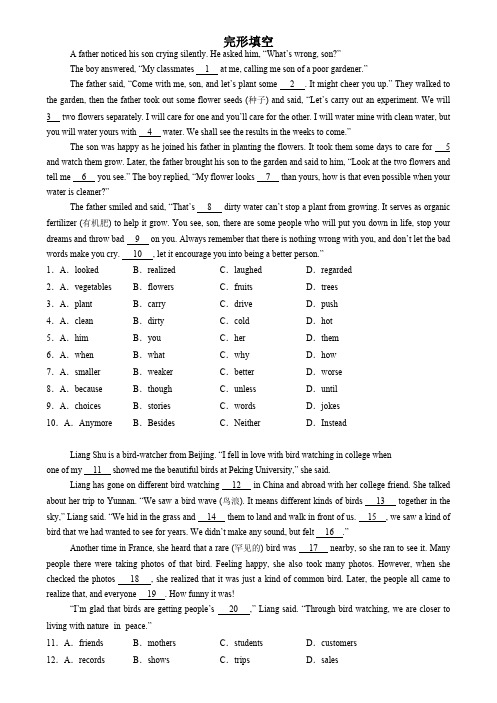
完形填空A father noticed his son crying silently. He asked him, “What’s wrong, son?”The boy answered, “My classmates 1 at me, calling me son of a poor gardener.”The father said, “Come with me, son, and let’s plant some 2 . It might cheer you up.” They walked to the garden, then the father took out some flower seeds (种子) and said, “Let’s carry out an experiment. We will 3 two flowers separately. I will care for one and you’ll care for the other. I will water mine with clean water, but you will water yours with 4 water. We shall see the results in the weeks to come.”The son was happy as he joined his father in planting the flowers. It took them some days to care for 5 and watch them grow. Later, the father brought his son to the garden and said to him, “Look at the two flowers and tell me 6 you see.” The boy replied, “My flower looks 7 than yours, how is that even possible when your water is cleaner?”The father smiled and said, “That’s 8 dirty water can’t stop a plant from growing. It serves as organic fertilizer (有机肥) to help it grow. You see, son, there are some people who will put you down in life, stop your dreams and throw bad 9 on you. Always remember that there is nothing wrong with you, and don’t let the bad words make you cry. 10 , let it encourage you into being a better person.”1.A.looked B.realized C.laughed D.regarded2.A.vegetables B.flowers C.fruits D.trees3.A.plant B.carry C.drive D.push4.A.clean B.dirty C.cold D.hot5.A.him B.you C.her D.them6.A.when B.what C.why D.how7.A.smaller B.weaker C.better D.worse8.A.because B.though C.unless D.until9.A.choices B.stories C.words D.jokes10.A.Anymore B.Besides C.Neither D.InsteadLiang Shu is a bird-watcher from Beijing. “I fell in love with bird watching in college whenone of my 11 showed me the beautiful birds at Peking University,” she said.Liang has gone on different bird watching 12 in China and abroad with her college friend. She talked about her trip to Yunnan. “We saw a bird wave (鸟浪). It means different kinds of birds 13 together in the sky,” Liang said. “We hid in the grass and 14 them to land and walk in front of us. 15 , we saw a kind of bird that we had wanted to see for years. We didn’t make any sound, but felt 16 .”Another time in France, she heard that a rare (罕见的) bird was 17 nearby, so she ran to see it. Many people there were taking photos of that bird. Feeling happy, she also took many photos. However, when she checked the photos 18 , she realized that it was just a kind of common bird. Later, the people all came to realize that, and everyone 19 . How funny it was!“I’m glad that birds are getting people’s 20 ,” Liang said. “Through bird watching, we are closer to living with nature in peace.”11.A.friends B.mothers C.students D.customers12.A.records B.shows C.trips D.sales13.A.eating B.flying C.walking D.landing14.A.waited for B.looked for C.cared for D.worked for15.A.Sadly B.Simply C.Recently D.Luckily16.A.bored B.excited C.relaxed D.worried17.A.brave B.proud C.active D.helpful18.A.lazily B.easily C.angrily D.carefully19.A.laughed B.arrived C.noticed D.agreed20.A.time B.magic C.money D.attentionMy five-year-old son and I were driving back home after school. He was 21 and wanted to know if we could run by Mcdonald’s and buy a hamburger. We drove into the parking spot (停车场) and in front of us was a car with an old lady inside. She looked 22 .I walked close to her and she told me that 23 car had broken down as soon as she drove out of the parking spot. I offered 24 her car back into the parking spot. She was so nervous that she couldn’t remember 25 her mobile phone. I called AAA car service andthen 26 her son to let him know she was safe. We waited with her until the AAA car arrived. She was unable to get into the AAA car 27 a recent knee operation (手术). My son and I drove her to where she was staying and helped take her bags inside. She had forgotten to get the 28 .We returned to McDonald’s and bought her dinner 29 then brought it back to her. Her son called me that evening and thanked me 30 his mother. My son was so sweet and told me that he was happy that we could help the lady.21.A.hungry B.thirsty C.tired D.sleepy22.A.happy B.quiet C.worried D.pretty23.A.my B.her C.your D.his24.A.to catch B.to hold C.to push D.to buy25.A.when to use B.why to use C.where to use D.how to use26.A.called B.warned C.wrote D.made27.A.since B.as C.because of D.while28.A.breakfast B.lunch C.water D.dinner29.A.and B.or C.but D.even30.A.seeing B.helping C.realizing D.saving根据短文内容,从A、B、C、D 四个选项中选出一个能填入相应空格内的最佳答案。
初三英语完型的方法和技巧
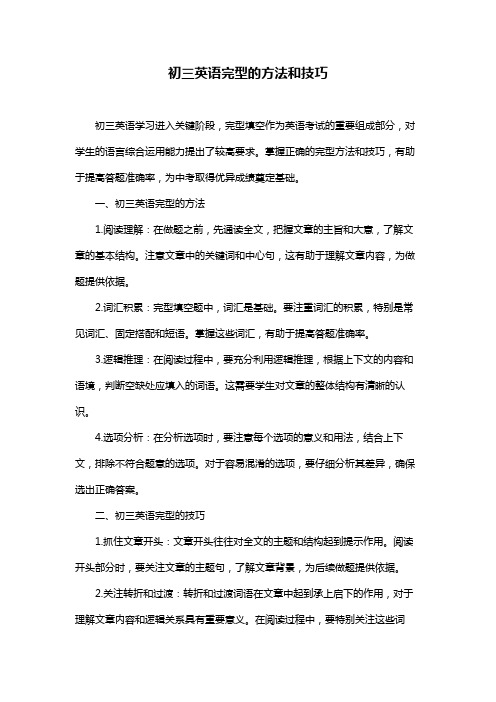
初三英语完型的方法和技巧初三英语学习进入关键阶段,完型填空作为英语考试的重要组成部分,对学生的语言综合运用能力提出了较高要求。
掌握正确的完型方法和技巧,有助于提高答题准确率,为中考取得优异成绩奠定基础。
一、初三英语完型的方法1.阅读理解:在做题之前,先通读全文,把握文章的主旨和大意,了解文章的基本结构。
注意文章中的关键词和中心句,这有助于理解文章内容,为做题提供依据。
2.词汇积累:完型填空题中,词汇是基础。
要注重词汇的积累,特别是常见词汇、固定搭配和短语。
掌握这些词汇,有助于提高答题准确率。
3.逻辑推理:在阅读过程中,要充分利用逻辑推理,根据上下文的内容和语境,判断空缺处应填入的词语。
这需要学生对文章的整体结构有清晰的认识。
4.选项分析:在分析选项时,要注意每个选项的意义和用法,结合上下文,排除不符合题意的选项。
对于容易混淆的选项,要仔细分析其差异,确保选出正确答案。
二、初三英语完型的技巧1.抓住文章开头:文章开头往往对全文的主题和结构起到提示作用。
阅读开头部分时,要关注文章的主题句,了解文章背景,为后续做题提供依据。
2.关注转折和过渡:转折和过渡词语在文章中起到承上启下的作用,对于理解文章内容和逻辑关系具有重要意义。
在阅读过程中,要特别关注这些词语,如:however, but, on the other hand等。
3.利用固定搭配:在完型填空题中,固定搭配出现的频率较高。
掌握这些搭配,有助于提高答题速度和准确率。
4.注意上下文逻辑关系:在分析选项时,要结合上下文的逻辑关系,如因果关系、转折关系、并列关系等,判断选项是否符合题意。
5.善于总结和归纳:在解题过程中,要善于总结和归纳文章中的关键信息,如人物、事件、地点等。
这有助于提高答题准确率。
总之,初三英语完型填空需要学生具备扎实的语言基础和良好的阅读理解能力。
中考英语完形填空解题技巧讲解

中考英语完形填空解题技巧讲解一、考情考项分析“完形填空”旨在考查学生语法和词汇知识综合运用能力。
其中涵盖词语搭配、近义词辨析、动词时态、句型结构、复合句的关联和习惯用法,又考查逻辑推理和事理推断能力。
近几年中考的完形填空仍是选择题型。
体裁上有记叙文、议论文、说明文。
题材上以思想、文化、商业、生活为主,同时涉及其他话题。
设空主要考察动词、名词、形容词、副词。
其他偶尔有代词、连词、介词短语。
二、完形填空要求填入的词归类1.语法结构所要求的功能词。
如:连接词、连接代词、连接副词、关系代词、关系副词等。
2.具有语法变化的普通词。
如:动词的时态、语态、语气,名词的数,代词的格,形容词和副词的等级等。
3.固定搭配短语或词组中的特定词。
4.同义词、近义词等易混淆词。
5.根据上下文意思及结构必须填入的确定词。
三、“完形填空”题解题策略1. 浏览—快速浏览,了解大意 (跳过空格,不要看选项)(约两分钟)。
快速阅读一下全文,领会大意,正确分析、归纳文章主旨。
2. 试填—瞻前顾后,先易后难,各个击破(约八分钟)。
先易后难,逐层深入。
在理解文章大意基础上,对每道题所给的词语进行剖析,考虑语境,上下呼应,运用逻辑思维进行推理,再根据自己最有把握的、最熟悉的短语、习惯用语、动词形式和句子结构等,先完成简单的,把难的留在后面。
(注意不会的题要做标记)。
3. 攻难—再细读全文,集中精力解决难点,填补空缺。
(约两分钟)4. 检查—复读全文,确保语意连贯,用词准确(约两分钟)。
试填后,再耐心通读全文,认真复查所选答案是否得当,语法是否正确,逻辑推理是否合理。
四、完形填空解题技巧技巧1、充分利用文章中有提示作用的词。
这是完型填空解题时最常用的方法之一。
这些词可以是原词复现、同义词、近义词或反义词, 也可以是并列连词或转折连词等等。
试看以下例题:原词复现:[例A. catB. birdC. pandaD. monkey反义词:[例2] Many people think that listening is a passive business. It is just the 51 one. Listening well is an active exercise of our attention and hard work.A. positiveB. oppositeC. sameD. wrong近义词[例3]I remember as a child I said something ________about somebody and my father said“Anytime you say something unpleasant about somebody else, it’s a reflection of you.”A. unkindB. unnecessaryC. unimportantD. unusual转折词[例4]My main responsibilities were clearing tables, ________ sometimes I helped cook.A. orB. soC. butD. even解析:答案B.本题中前面说我的主要职责是….., 后面应该填写和main有转折意思的词,但是有时候也做饭。
初中中考英语总复习讲义课件 题型突破 完形填空
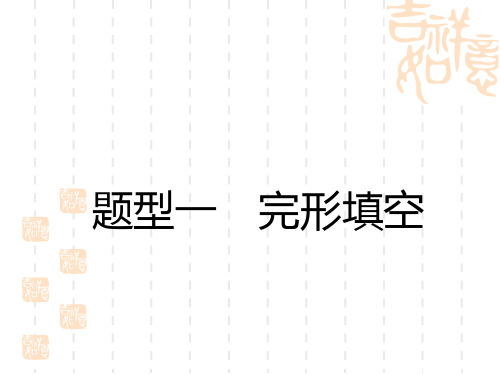
▪ Mostoftheseboys'parentsworkinbigcitiesfar fromthevillage.Inthepast, theywereafraidofshowingthemselvesinpublic, 4nowthroughsoccer, theyhavebecomeoutgoing,
activeandbrave.Andtheirskillsinsoccerhaveimpro vedrapidlybyworkinghard.Inashorttime,
theyhave5theotherteamsfromnearbyschoolsinthe
city.
▪ Toopen6minds,
Mr.Xiongencouragedthemtojoinina
the game”
和“so they finally lost 1—0”可推知,他们一开始踢得并不好。B 项意为
“开头,开始部分”,符合语境。故选 B。命题点:语境推断
A▪ ( )8.A.controlled B.passed ▪ C.finished D.recorded
【解析】 考查动词辨析。根据上文中的“with the physical advantages” 可推知,此处表示由于体力优势,他们很快就掌控了比赛。A 项意为“控 制”,符合语境。故选 A。命题点:语境推断、逻辑推理
题型一 完形填空
1
命题特点
2
解题技巧
命题特点
▪ 完形填空题是将英语知识和英语运用有机地 相结合,在具体语篇环境下,着重考查学生 在阅读理解基础上对词汇知识的灵活运用能 力。
▪ 1.体裁:以记叙文为主,兼顾说明文。
▪ 2.词数:270个左右;生词标注:1—3个。
中考英语完形填空答题技巧

中考英语完形填空答题技巧1.跳过空格、通读全文、把握大意。
先跳过空格,通读试题所给的要完形填空的短文,获得整体印象,做到弄清文脉、抓住主旨,较好地把握短文大意。
要在阅读理解短文意思的基础上才开始判定选择,切忌仓促下笔。
2.结合选项、综合合计、初定答案。
在理解全文意思的基础上,再结合所给备选项细读全文,联系上、下文内容,注意从上、下文的语法结构和词语搭配及从选择项中寻找解题的提示,以词、句的意义为先,再从分析句子结构入手,依据短文意思、语法规则、词语固定搭配等进行综合合计,对备选项逐一进行分析、比较和筛选,排除干扰项、初步选定答案。
3.瞻前顾后、先易后难、各个击破。
动笔时要瞻前顾后、通篇合计、先易后难。
对比较显然直接的、自己最有把握的答案先做,一下子不能确定答案的,先跳过这一空格,持续往下做,最后回过头来再集中精力解决难点。
这时可结合已确定答案的选项再读一遍短文,随着对短文理解的深入,可以降低试题的难度,提升选择的正确率。
4.复读全文、逐空验证、弥补疏漏。
完成各道题选择后,把所选的答案代入原文,再把全文通读一篇,逐空认真复查。
看所选定的答案是否使短文意思前后连贯、顺理成章,语法结构是否正确,是否符合习惯表达法。
如发现错误答案或有疑问的,应再次推敲、反复斟酌、做出修正。
2做完形填空选择题时应注意要点1.完形填空的短文通常没有标题且文章的首句和尾句,一般不设空,要特别注重对首、尾句的理解,因为它们往往提示或点明文章的主题,对理解全文有较大帮助。
2.第一遍通读带有空缺单词的短文时可能一时把握不住短文内容,弄不清头绪,这是很正常的。
此时要注意克服畏难情绪和急躁心理,应稳定情绪,再将短文读一、二遍,直到明确大意为止。
3.做题时切勿一看到一个空格就急着选出一个答案,这样往往只见树木不见树林。
由于缺乏全局观念,极易导致连续选错。
因为完形填空不同于单个句子的选词填空,其空白处是位于一篇文章之中,因此必须纵观全文、通篇合计。
初中英语中考完形填空答题指导(答题技巧+解题步骤)
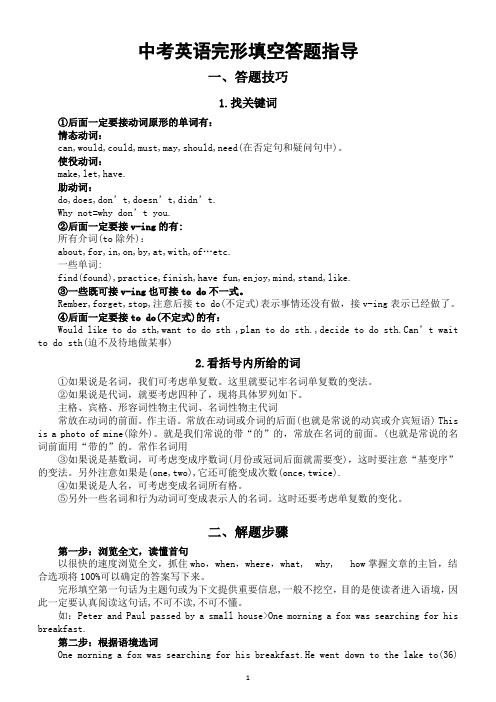
中考英语完形填空答题指导一、答题技巧1.找关键词①后面一定要接动词原形的单词有:情态动词:can,would,could,must,may,should,need(在否定句和疑问句中)。
使役动词:make,let,have.助动词:do,does,don’t,doesn’t,didn’t.Why not=why don’t you.②后面一定要接v-ing的有:所有介词(to除外):about,for,in,on,by,at,with,of…etc.一些单词:find(found),practice,finish,have fun,enjoy,mind,stand,like.③一些既可接v-ing也可接to do不一式。
Rember,forget,stop,注意后接to do(不定式)表示事情还没有做,接v-ing表示已经做了。
④后面一定要接to do(不定式)的有:Would like to do sth,want to do sth ,plan to do sth.,decide to do sth.Can’t wait to do sth(迫不及待地做某事)2.看括号内所给的词①如果说是名词,我们可考虑单复数。
这里就要记牢名词单复数的变法。
②如果说是代词,就要考虑四种了,现将具体罗列如下。
主格、宾格、形容词性物主代词、名词性物主代词常放在动词的前面。
作主语。
常放在动词或介词的后面(也就是常说的动宾或介宾短语) This is a photo of mine(除外)。
就是我们常说的带“的”的,常放在名词的前面。
(也就是常说的名词前面用“带的”的。
常作名词用③如果说是基数词,可考虑变成序数词(月份或冠词后面就需要变),这时要注意“基变序”的变法。
另外注意如果是(one,two),它还可能变成次数(once,twice).④如果说是人名,可考虑变成名词所有格。
⑤另外一些名词和行为动词可变成表示人的名词。
中考英语《完型填空》复习专项选择题复习资料(含答案)
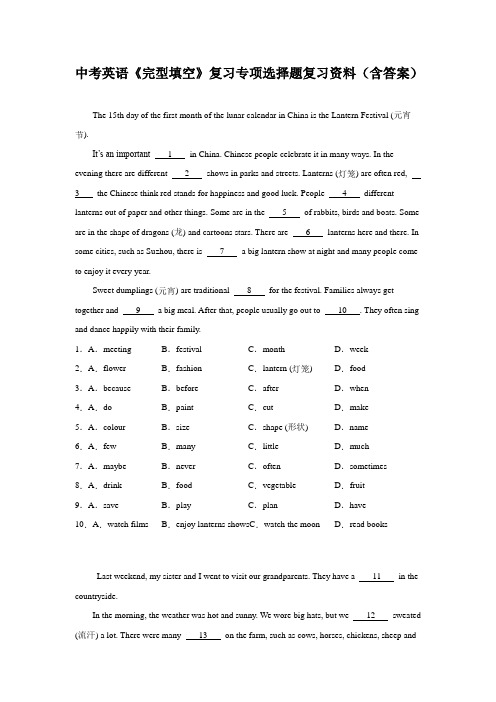
中考英语《完型填空》复习专项选择题复习资料(含答案)The 15th day of the first month of the lunar calendar in China is the Lantern Festival (元宵节).It’s an important 1 in China. Chinese people celebrate it in many ways. In the evening there are different 2 shows in parks and streets. Lanterns (灯笼) are often red,3 the Chinese think red stands for happiness and good luck. People4 different lanterns out of paper and other things. Some are in the5 of rabbits, birds and boats. Some are in the shape of dragons (龙) and cartoons stars. There are6 lanterns here and there. In some cities, such as Suzhou, there is7 a big lantern show at night and many people come to enjoy it every year.Sweet dumplings (元宵) are traditional 8 for the festival. Families always get together and 9 a big meal. After that, people usually go out to 10 . They often sing and dance happily with their family.1.A.meeting B.festival C.month D.week 2.A.flower B.fashion C.lantern (灯笼) D.food 3.A.because B.before C.after D.when4.A.do B.paint C.cut D.make 5.A.colour B.size C.shape (形状) D.name6.A.few B.many C.little D.much 7.A.maybe B.never C.often D.sometimes 8.A.drink B.food C.vegetable D.fruit9.A.save B.play C.plan D.have 10.A.watch films B.enjoy lanterns showsC.watch the moon D.read booksLast weekend, my sister and I went to visit our grandparents. They have a 11 in the countryside.In the morning, the weather was hot and sunny. We wore big hats, but we 12 sweated (流汗) a lot. There were many 13 on the farm, such as cows, horses, chickens, sheep andhens. I 14 all the animals on the farm, and my sister collected (收集) eggs from the hens and 15 the cows.In the afternoon, we picked apples and helped my grandparents take these apples to their home. We felt 16 after the one-day work, but we were quite happy to help them. At night, it was 17 and kind of cold, so we made a campfire in the yard. My grandparents, my sister and I sat 18 the campfire and told each other some funny stories. Then my sister sang songs and danced for us. The next morning, when we 19 , we heard the songs of birds.After breakfast, we took the bus home. On the bus, we ate the cakes from my grandmother. They 20 very delicious.We really had an unforgettable (难忘的) weekend.11.A.cinema B.forest C.farm D.museum 12.A.again B.still C.yet D.quite 13.A.animals B.things C.gifts D.meat 14.A.grew B.taught C.followed D.fed15.A.flew B.milked C.moved D.ordered 16.A.special B.excited C.tired D.surprised 17.A.dark B.fast C.sunny D.slow 18.A.along B.around C.down D.up19.A.got lost B.woke up C.ran away D.got popular 20.A.sounded B.looked C.tasted D.feltA 6-year-old girl had been shopping with her mom in the supermarket. It was raining hard at the moment. We all stood 21 the door of the supermarket and waited quietly. The girl’s sweet 22 broke the silence.“Mom, let’s run through the rain,” she said. “No, honey. We’ll wait 23 it slows down a bit,” Mom replied. The girl waited about another minute and repeated, “Mom, let’s run through the rain.” “We’ll get wet if we do,” Mom said. “No, we won’t, Mom. That’s not what you said this morning,” the young girl said. “This morning? When did I say we 24 run through the rainand not get wet?” “When you 25 with daddy about his illness in the hospital, you said, if we can get through this, we can get through anything!” We all stood quietly. 26 left in the next few minutes.Mom thought for a moment about what she wou ld say. “Honey, you are 27 . Let’s run through the rain. If we get wet, maybe we just need washing,” Mom said. Then they ran 28to the street. We all stood and watched 29 run past the cars. Although they held their shopping bags over their heads, they 30 got wet. Then they were followed by a few who screamed and laughed like children all the way to their cars.21.A.inside B.against C.opposite D.towards 22.A.smell B.voice C.dream D.smile23.A.if B.until C.after D.though 24.A.must B.would C.could D.should 25.A.said B.talked C.told D.fought 26.A.Nobody B.Anybody C.Somebody D.Everybody 27.A.right B.kind C.careful D.patient 28.A.sadly B.suddenly C.happily D.nervously 29.A.it B.her C.him D.them 30.A.only B.also C.even D.stillA little boy invited his mother to attend his school’s first teacher - parent meeting. He was very 31 to hear that she agreed to go. This would be the first time that his classmates and teacher met his mother and he felt sorry for her 32 . Although she was a beautiful woman, there was a serious scar (疤痕) 33 her right face. The boy never wanted to talk about34 or how she got the scar.At the meeting, the people were impressed by the kindness and natural beauty of his mother 35 she had the scar. But the little boy was still embarrassed and hid 36 from everyone. Just then, he 37 a conversation between his mother and the teacher.“How did you get the scar on your face, Madam?” The teacher asked carefully.The mother replied, “When my son was a baby, hi s room caught fire one day. Everybody wastoo scared to get into his room, but I did. When I was running towards his bed, a long piece of wood 38 down and I put myself over him. Finally, when I woke up I found I was in the hospital.” She touched her right face. “The scar was left on my face, but I have never 39 what I did for my son. You see, he is strong and healthy now.”Hearing that, the little boy cried sadly and ran to his mother. He hugged his mother and felt great 40 from his mother. He held her hand tightly for the rest of the day. 31.A.interested B.surprised C.interesting D.surprising 32.A.clothes B.expression C.build D.look33.A.on B.in C.at D.over 34.A.when B.what C.that D.which 35.A.unless B.because C.though D.whether 36.A.him B.her C.himself D.it 37.A.made B.exchanged C.had D.heard 38.A.felt B.fell C.lay D.cut 39.A.regretted B.forgot C.recalled D.forgave 40.A.sadness B.love C.patience. D.pityOnce there was a famine (饥荒) in the town. A rich and kind baker sent some bread to the poor children. He said to them, “In this 41 there is some bread for you. Each of you can have one loaf every day until the hard days end.”The impatient children 42 to the basket. They shouted and fought for the bread43 each wished to have the largest loaf. At last they went away without thanking the good gentleman. But Shirley, a poorly-dressed little girl, did not join them. Instead, she 44 standing quietly. When the other children had left, she took the smallest loaf in the basket, 45 the gentleman’s hand and went home.The next day the children were as 46 as before. Poor shy Shirley still took the smallest loaf. When she got home, her mother cut the bread open. Many new shining pieces of silver fell out of it. Her mother said 47 , “Take the money back to the go od gentleman at once, for it must have got into the loaf 48 . Be quick. Shirley! Be quick!”But when the little girl gave the rich man her mother’s message, he said, “No, no, my child. It was no 49 . I put silver pieces into the smallest loaf to reward you because you are a kind and 50 girl. Go home and the money is yours now.”41.A.basket B.fridge C.kitchen42.A.failed B.rushed C.supposed 43.A.unless B.though C.because 44.A.remained B.regretted C.avoided 45.A.washed B.kissed C.tasted46.A.helpful B.impolite C.intelligent47.A.sadly B.gradually C.surprisedly48.A.on time B.in person C.by accident 49.A.mistake B.trade C.secret50.A.local B.honest C.painfulMrs. White has a lovely young cat, and it is the cat’s first winter. One evening, it is 51 outside when it begins to snow. Mrs. White 52 everywhere and shouts (呼喊) its name. But she can’t find it. So she 53 the police, and said, “I 54 a cat. Does anyone find one?” “No, Madam.” answers the policeman at the other end. “I will ring you up if someone finds it. What 55 is your cat?” “White.” “I think it may be in the snow. But don’t worry. I know cats are really very 56 animals.” “They sometimes live for a few days in the snow, and until it melts (融化) or somebody finds them, they’re quite all right. “Mrs. White feels 57 when she hears this. “Yes, yes. I think you are 58 ,” she says, “and my cat is very clever. She can almost talk.” The policeman is getting tired. He says, “ 59 don’t you p ut down your telephone? Perhaps (或许) she is trying to 60 you now. “51.A.cold B.hot C.sunny D.dry52.A.puts B.stands C.sits D.looks 53.A.telephones B.tells C.asks D.speaks 54.A.buy B.want C.lose D.have 55.A.name B.face C.size D.color56.A.happy B.big C.strong D.nice 57.A.sad B.happy C.interesting D.tired 58.A.right B.wrong C.easy D.hard 59.A.How B.Why C.When D.Where 60.A.call B.catch C.kill D.meetThe Brown Clothes Store is on sale(大甩卖). I want to buy new clothes. Let’s 61and have a look. They sell all clothes at very good 62 . 63 are the shirts? The green shirts are $ 15 each(每一), 64 the yellow ones are $ 20 each. What about the sweaters? They 65 brown sweaters for $ 22. They sell trousers and shoes, too. They have black trousers for children for only $ 13. They have shoes 66 white for only $ 28. Oh, the yellow hat looks 67 . I like it very much. How much 68 it? It’s only $2. I’ll take 69 . What do you want to buy? I really have 70 good day here. Come and buy! 61.A.go B.to go C.going D.goes 62.A.price B.prices C.a price D.the price 63.A.How many B.How much C.How old D.How long 64.A.and B.or C.because D.so 65.A.have B.has C.are have D.to have 66.A.on B.to C.in D.about 67.A.nicely B.nice C.nicer D.nicest 68.A.are B.do C.does D.is69.A.it B.them C.they D.its70.A.the B.an C.a D./In learning English, one should pay attention to listening and speaking. You’d better 71 speak while listening. Don’t be 72 to make mistakes. But be careful not to let them73 you improving your English. While you are doing this, a good way is 74 a diary. When you write, you will easily find many mistakes in speaking. Then if you can, ask some75 to go through(浏览)what you have written and 76 you where it is wrong.If you are slow in speaking, don’t 77 about it. One of the helpful ways is 78 . The important thing is to choose something 79 . It mustn’t be too difficult for you. When you are reading in this way, don’t stop to 80 the new words in the dictionary if you can guess their meanings when they have nothing to do with the sentences.71.A.let B.make C.cry D.try72.A.tired B.proud C.afraid D.good 73.A.help B.stop C.decide D.start 74.A.keep B.keeps C.kept D.to keep 75.A.other B.the others C.another D.others 76.A.talk B.tell C.ask D.say 77.A.worried B.think C.worry D.speak 78.A.listening B.spelling C.reading D.speaking 79.A.special B.interesting C.exciting D.surprising 80.A.find out B.look up C.find D.look forThe school is a place where students learn, make friends and grow. But for someone, school can be far from these things. Here is Becky’s story at her middle school.Through her first year in middle school, she had to do a lot of work because her parents81 her to be a top student. 82 there was so much pressure (压力) for her to do well in all her exams and keep improving.83 , when she went into Grade 9, her worries became greater. It was becoming more and more 84 for her to stay focused (专注的). She started seeing the school doctor. However, a big problem 85 . She had to leave lessons to see the doctor. Every time she left, her 86 would ask, “Where are you going?” She couldn’t talk to many people about her feelings.Becky got some 87 from an expert. “Deep breaths, Becky.” she thought to herself when she got 88 . And also, she learned to give herself a small gift when she made a little progress (进步).If you are a teenager who often feels 89 about schoolwork, do something to help yourself. 90 that schoolwork is important, but your mental (精神的) health comes first. 81.A.expected B.helped C.chose D.invited82.A.If B.But C.Or D.Unless 83.A.Firstly B.Unluckily C.Finally D.Probably 84.A.necessary B.dangerous C.difficult D.important 85.A.appeared B.solved C.deleted D.prepared 86.A.parents B.guests C.students D.classmates 87.A.experience B.advice C.reason D.hope 88.A.worried B.angry C.careless D.poor 89.A.good B.upset C.surprised D.excited 90.A.Trust B.Think C.Remember D.ExperienceAs we all know, Chinese students are hard-working. But they’re 91 at the same time.At school, they have to follow the strict school rules. For example, they 92 have long hair or wear strange (奇怪的) clothes.And at home, they’re busy with their homework and they don’t have any free time to do what they like. 93 they don’t do well in exams, their parents will be angry with them.On weekends, they are 94 than on weekdays. Their parents take them to have differen t classes they don’t like. They 95 feel tired and bored. They 96 interest in school things slowly. Some students can’t stand it and leave home. Because their parents only care about children’s study and they never mind what children 97 this.“In their parents’ mind, 98 is important except (除了) children’s study. Many students study all day. Some students even don’t know how to get on well with others and 99 to take care of others,” said a expert.“This is a serious problem. It’s necessary 100 us to think it over and solve it well,” said another expert.91.A.glad B.unhappy C.kind D.healthy 92.A.mustn’t B.needn’t C.shouldn’t D.may not93.A.After B.Before C.Because D.If 94.A.funnier B.busier C.lazier D.earlier 95.A.never B.ever C.always D.hardly 96.A.have B.show C.lose D.take 97.A.make up B.think of C.find out D.fall down 98.A.something B.everything C.anything D.nothing 99.A.how B.where C.why D.whether 100.A.with B.at C.in D.for参考答案1.B2.C3.A4.D5.C6.B7.C8.B9.D10.B11.C12.B13.A14.D15.B16.C17.A18.B19.B20.C21.A22.B23.B24.C25.B26.A27.A28.C29.D30.D31.B32.D33.A34.A35.C36.C37.D38.B39.A40.B41.A42.B43.C44.A45.B46.B47.C48.C49.A50.B51.A52.D53.A54.C55.D56.C57.B58.A59.B60.A61.A62.B63.B64.A65.A66.C67.B68.D69.A70.C71.D72.C73.B74.D75.D76.B77.C78.C79.B80.B81.A82.B83.B84.C85.A86.D87.B88.A89.B90.C91.B92.A93.D94.B95.C96.C97.B98.D99.A100.D。
初中英语完形填空解题技巧必看

初中英语完形填空解题技巧必看学习外语并不难,学习外语就像交朋友一样,朋友是越交越熟的,天天见面,朋友之间就亲密无间了。
重复重复再重复,熟练熟练再熟练,是学会英语的不二法门。
下面是小编给大家整理的一些初中英语完形填空解题技巧的学习资料,希望对大家有所帮助。
初中英语完形填空的解题技巧1快速通读全文,掌握短文大意快速掌握文中的时间、地点、人物及事件。
认真阅读短文开头的第一、二句,及每段的第一句,结合选项初步弄清短文写了些什么内容。
准确地预测和推断短文的主要意义。
2解结构、语意及逻辑,推断和预测选项利用上下文的提示,用学过的知识和已有的生活经验,扫清部分词汇理解上的障碍。
在理解全文意思的基础上,结合文章内容对空缺句子作合乎逻辑的推理。
必须弄清空缺词句的确切含义,空缺词句与其前后句的意义衔接必须自然、合理,不可出现意义断层或说东道西的情况,必须从空缺句的内部结构入手,从语法、词语固定搭配、词形变化等角度考虑,务必使所填的单词准确无误。
根据词的意义和用法进行选择,重复考虑语境。
上下文找线索,上下文找提示。
完形填空的文章都是一个意义相关联的语篇,它围绕一个话题论述,在行文中词语重复、替代等现象是不可避免的。
根据这个原则,某个空格所对应的答案很可能就在上下文中重复出现的相关词。
所以,可以根据这些词之间的有机联系确定答案。
3要特别留意语法如单词的各种形式的变化,种类句型的结构等。
单词的变化a.名词的选择,应联系文章主题及空格前后出现的有关词,注意其性和数的一致。
b.动词的选用,要注意词义和惯用搭配,还要区分近义词之间的用法差异及所给词的形式。
c.选择介词,应注意其惯用法,特别是与动词或其他词组成的固定搭配。
d.选择代词,要注意性、数是否准确。
e.选择连词,要注意分析前后句或上下文的逻辑关系。
f.选择形容词和副词,要注意词义的区别,用于比较时,还要注意词形变化。
要注意句法题,搞清句子的种类、类型、省略和倒装a.句子的种类包括陈述句、疑问句、祈使句和感叹句。
中考英语首字母填空技巧及练习
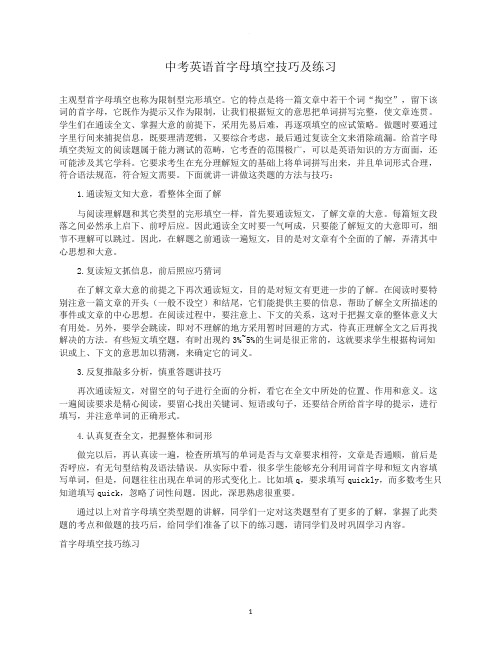
中考英语首字母填空技巧及练习主观型首字母填空也称为限制型完形填空。
它的特点是将一篇文章中若干个词“掏空”,留下该词的首字母,它既作为提示又作为限制,让我们根据短文的意思把单词拼写完整,使文章连贯。
学生们在通读全文、掌握大意的前提下,采用先易后难,再逐项填空的应试策略。
做题时要通过字里行间来捕捉信息,既要理清逻辑,又要综合考虑,最后通过复读全文来消除疏漏。
给首字母填空类短文的阅读题属于能力测试的范畴,它考查的范围极广,可以是英语知识的方方面面,还可能涉及其它学科。
它要求考生在充分理解短文的基础上将单词拼写出来,并且单词形式合理,符合语法规范,符合短文需要。
下面就讲一讲做这类题的方法与技巧:1.通读短文知大意,看整体全面了解与阅读理解题和其它类型的完形填空一样,首先要通读短文,了解文章的大意。
每篇短文段落之间必然承上启下、前呼后应。
因此通读全文时要一气呵成,只要能了解短文的大意即可,细节不理解可以跳过。
因此,在解题之前通读一遍短文,目的是对文章有个全面的了解,弄清其中心思想和大意。
2.复读短文抓信息,前后照应巧猜词在了解文章大意的前提之下再次通读短文,目的是对短文有更进一步的了解。
在阅读时要特别注意一篇文章的开头(一般不设空)和结尾,它们能提供主要的信息,帮助了解全文所描述的事件或文章的中心思想。
在阅读过程中,要注意上、下文的关系,这对于把握文章的整体意义大有用处。
另外,要学会跳读,即对不理解的地方采用暂时回避的方式,待真正理解全文之后再找解决的方法。
有些短文填空题,有时出现约3%~5%的生词是很正常的,这就要求学生根据构词知识或上、下文的意思加以猜测,来确定它的词义。
3.反复推敲多分析,慎重答题讲技巧再次通读短文,对留空的句子进行全面的分析,看它在全文中所处的位置、作用和意义。
这一遍阅读要求是精心阅读,要留心找出关键词、短语或句子,还要结合所给首字母的提示,进行填写,并注意单词的正确形式。
4.认真复查全文,把握整体和词形做完以后,再认真读一遍,检查所填写的单词是否与文章要求相符,文章是否通顺,前后是否呼应,有无句型结构及语法错误。
英语中考题专题解读-完形填空

( )41.A.fruits ( )42.A.look at ( )43.A.family ( )44.A.cry ( )45.A.moved ( )46.A.play ( )47.A.eat ( )48.A.sadly ( )49.A.clean ( )50.A.difficult
B.flowers B.take away B.class B.see B.interested B.work B.sell B.slowly B.small B.sunny
【语篇分析】 本文语篇类型为记叙文,介绍了Molly一家人在遭受火灾时得 到邻居的帮助渡过了难关,在新冠疫情下Molly一家通过与邻居 分享他们自家种的菜来回馈邻居的故事。选材话题属于“人与 社会”主题下的子主题“良好的人际关系、社区生活”,体现 了邻居之间互助,积极向上的生活态度。
【参考答案】 41~45 DBACA 46~50 BCBDA
2
2
3
3
2
代词
-
-
-
-
-
动词
fill,describe agree, realize
refuse
Protect, encouraging,
see
help, work, share
动词短语
2
2
carry out, went away,
set off
ask for
1 ask for
3 looking for
seriously 1 -
Moved, popular,difficult
3 -
slowly 1 -
要做好完形填空,必须掌握一定的解题方法和技巧,才能尽量不丢分。 一般来说,做完形填空题,要遵循三个步骤:
【中考英语总复习 考点专项练习】35 完形填空之记叙文(原卷及答案)

专项35 完形填空之记叙文一、命题趋势完形填空是英语考试中一项重要的考查内容。
完形填空也是一种综合能力测试题,是对学生语法、词汇、句型、阅读能力、理解能力和逻辑推理能力的一种多方位的检测。
按照考试大纲要求,通常在一篇200词左右的难度适中的文章中留出10个空白,要求学生从所给的A、B、C、D四个选项中选出一个最佳答案,使补足的短文意思通顺、结构完整。
综观各地往年中考真题,记叙文居多,而且近年中考中记叙文所占比例超过50%,预测2019年中考完形填空也会以记叙文为主,侧重考查实词和对上下文语境、逻辑的理解。
二、考试内容完形填空考题要求考生在阅读过一篇不完整的文章后,能根据上下文意思,在所给的选项中选择最佳答案。
其考查点有:1. 能够掌握足够的词汇量,正确运用词类和词语的正确搭配。
包括名词、代词、冠词、动词等词类和短语等。
2. 基础语法知识。
包括句法、固定搭配、句型、词语加惯用法、时态、语态、主从复合句等。
3. 还应具有一定的语言运用能力、阅读能力、理解能力、综合分析能力和逻辑判断能力。
① 以语篇为载体,测试语言知识和语言能力。
试题既考查学生对短文的整体理解能力,也考查学生运用语法知识、词汇知识的能力以及对事物的逻辑推理、分析判断能力。
① 以意义填空为主。
试题在着重考查考生阅读理解能力的前提下,兼顾对语言知识、常识、逻辑推理能力的考查。
① 降低对单词本身词义的考查要求,注重考查对全文意义的理解。
中考完形填空备选项中所涉及的词汇基本上都是常见的初级词汇。
① 考点分布符合考查目的。
试题以名词、动词、形容词和副词等信息词汇为考查重点,淡化对介词、连词、冠词等结构词的考查,以检测学生在具体情境中灵活运用所学知识的能力。
①有的采用主观试题形式。
有些完形填空题全部舍弃了学生们平时接触较多的"四选一"形式,而改之以"自由完形填空"形式,除了要求填入单词外,有的还设置了要求填入词组三、命题特点1. 选文特点:① 以叙述文体的小故事为主;① 篇幅一般在200~300词之间;① 难度略低于阅读理解中的短文;① 所选短文语言地道、纯正,结构严谨,层次分明,逻辑性强。
2020中考英语专题复习-----完形填空(附答案)

芝麻开门1知己知彼用兵如神【典型例题】【2018海淀一模】It was 1st January, the first day of the year and a holiday for me. I thought of gettingthe bank work out of the way. The bank person just nodded to my 35 “Happy New Year” whenI sat in front of him.He was busy at that moment. After a few minutes he took my form and started filling in mydetails. I sat there 36 why we had computerized banking if we were still filling in forms.After waiting for a few more minutes, in which I showed all 37 of being impatient, I askedhim if my work was done. He shouted even without looking at me, “Nothing is done, it will taketime!”Just then I saw his morning cup of tea which had been lying there for ten minutes, untouched.2The tea had turned 38 cold while he was doing his work. Suddenly I felt what this man must be feeling when customers 39 me came always in a hurry to get their work done. We did not even 40 the need to thank them for being there. He must be feeling so 41 that “here comes a nother person who will push me for doing his work first.”On an instinct(直觉) I told him, “Sir, please have your tea, I am not in a hurry.” He suddenly looked up at me and for the first time we had eye contact. I saw both of us sailing in the same boat. I felt that he was also 42 the small things in life like a cup of hot tea for a few more minutes. He gave me a smile and said, “It is an everyday affair with me; you are not in a hurry but 43 else will come, who will be in a hurry.”He really touched my heart with his wise 44 . I felt that we had all put shields (盾牌) on our hearts like we put gloves on our hands. All this time I thought of him as a robot, someone who was there for my convenience, 45 today I suddenly felt a strange closeness with him. I promised to be more friendly with people who helped me and be 46 that they were there for me.35. A. sad B. angry C. polite D. honest36. A. requiring B. wondering C. expecting D. arguing37. A. things B. points C. signs D. facts38. A. almost B. still C. hardly D. only39. A. from B. with C. for D. like40. A. accept B. feel C. insist D. meet41. A. surprised B. terrified C. annoyed D. embarrassed42. A. facing B. finding C. losing D. missing43. A. somebody B. anybody C. nobody D. everybody44. A. ways B. words C. values D. letters45. A. as B. though C. and D. but46. A. thankful B. patient C. hopeful D. lucky【大意分析】主人公在银行办理个人业务时,起初对银行工作人员的服务非常不满,表现得很不耐烦。
中考英语总复习完形填空阅读理解词汇运用组合训练一(带答案)
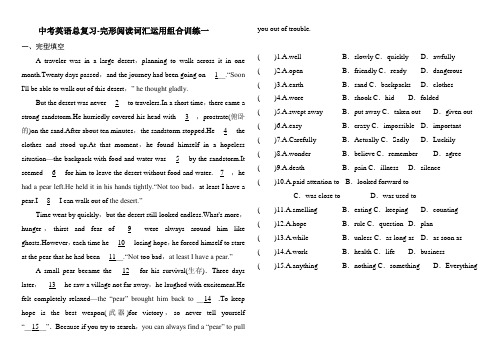
中考英语总复习-完形阅读词汇运用组合训练一一、完型填空A traveler was in a large desert,planning to walk across it in one month.Twenty days passed,and the journey had been going on __1__.“Soon I'll be able to walk out of this desert,” he thought gladly.But the desert was never __2__ to travelers.In a short time,there came a strong sandstorm.He hurriedly covered his head with __3__,prostrate(俯卧的)on the sand.After about ten minutes,the sandstorm stopped.He __4__ the clothes and stood up.At that moment,he found himself in a hopeless situation—the backpack with food and water was __5__ by the sandstorm.It seemed __6__ for him to leave the desert without food and water.__7__,he had a pear left.He held it in his hands tightly.“Not too bad,at least I have a pear.I __8__ I can walk out of the desert.”Time went by quickly,but the desert still looked endless.What's more,hunger,thirst and fear of __9__ were always around him like ghosts.However,each time he __10__ losing hope,he forced himself to stare at the pear that he had been __11__.“Not too bad,at least I have a pear.”A small pear became the __12__ for his survival(生存).Three days later,__13__ he saw a village not far away,he laughed with excitement.He felt completely relaxed—the “pear” brought him back to __14__.To keep hope is the best weapon(武器)for victory,so never tell yourself “__15__”.Because if you try to search,you can always find a “pear” to pull you out of trouble.()1.A.well B.slowly C.quickly D.awfully()2.A.open B.friendly C.ready D.dangerous ()3.A.earth B.sand C.backpacks D.clothes()4.A.wore B.shook C.hid D.folded()5.A.swept away B.put away C.taken out D.given out ()6.A.easy B.crazy C.impossible D.important()7.A.Carefully B.Actually C.Sadly D.Luckily()8.A.wonder B.believe C.remember D.agree ()9.A.death B.pain C.illness D.silence()10.A.paid attention to B.looked forward toC.was close to D.was used to()11.A.smelling B.eating C.keeping D.counting()12.A.hope B.rule C.question D.plan()13.A.while B.unless C.as long as D.as soon as ()14.A.work B.health C.life D.business()15.A.anything B.nothing C.something D.Everything二、阅读理解Passage 1For a long time,a boy wondered why his desk-mate was always the first in the class,but he could only rank(排名)the 21st.At home,he asked his mom,“Am I more stupid than other kids?How con I always fall behind?I just can't come up with an answer.” Mom found that her son's selfrespect had been hurt by the ranking system,but she didn't know what to say to help.She was planning to say that intelligence(智商)is different and that yes,her son's friend really was the smarter boy.But that would have made her son more unhappy.Thank goodness she stopped herself from saying so.Her son and his friend went on to high school that year.However,although he worked as hard as he could,her son's friend still outdid him.But she was proud of her boy for his hard work,truly proud.It was around this time she decided to take him on a trip to the seaside.On the trip,she at last found an answer for him.Today her son no longer cares about rankings.He doesn't have to,for he himself is now the top of the class—at the top national university he is in.Invited to his old high school,he mentioned his childhood experience:“Once,on a trip to the sea,my mother and I were lying on the beach.She pointed to the sea and said to me:‘Do you see the seabirds fighting for food out there?When a wave(浪)comes near,the little birds fly high ‘quickly’.The ‘clumsy’(笨拙的)birds are much slower and have to try really hard to get a way from the wave.But these ‘clumsy’ birds also try hard to show that they have the biggest,strongest wings,which allow the birds to travel the farthest.When the season changes,they leave for foreign shores,leaving the little birds behind.Son,I have a feeling that you are one of those seabirds.”()1.From the first paragraph,we could find the mother ______. A.knew her son was not bright enoughB.was troubled by her son's low rankingsC.saw the bad results of the ranking systemD.decided to help with her son's school work()2.The Mom didn't give an answer at first because she thought ______. A.that would hurt her sons self-respectB.intelligence doesn't mean everythingC.her son would forget his rankings soonD.her son was not strong enough for the truth()3.We can learn from the story ______.A.rankings can show intelligenceB.parents should encourage childrenC.no work can lead to a change in rankingsD.the experience in childhood is unnecessary()4.The best title for the passage may probably be ______.A.Hard-working BoyB.Mom's AnswerC.Son's RankingD.Little SeabirdsPassage 2I am not interested in making New Year's resolutions.Making promises to myself just because the calendar changed doesn't make any sense to me.But this year,there came a defining(决定性的)moment.It came when my adult children,who'd been home for two weeks,headed back to their homes.There was a sadness I felt as I waved until their cars went out of sight,not knowing when I'd see them again.But there was also a knowing at that moment that something in me needed to change.So I asked myself,“What is truly good in your life?”What is good is my relationships with my children,but not only those relationships.What also keeps my heart beating is creating a home,no matter who is there,and cooking balanced,plant-based meals,even if just for me.I find joy in nature and connecting with close friends and my family.I love doing photography and writing and teaching myself the piano.Whatever was missing from my life,at the end of last year,I knew about the parts that worked.And as winter ended and the last of the visiting children was ready to leave,I looked to the future.I think of my friend,Lisa,who in May lost her husband of 30 years to cancer,and who found herself on New Year's Eve with no one to be with.Her loneliness was profound at that turning-point moment,but her sadness was momentary(短暂的).“I realized I had a choice,” she told me.Instead of giving way to loneliness and despair,she chose to find something productive to do.We humans can become bored with defeat.We know something is just the other side,like a new year.I have two choices.I can brand myself as the long-suffering mother who never figured out how to live on after her children left.Or I can take to the piano in the center of the house each day and practice Ode to Joy(《欢乐颂》)with one hand until such time as I feel ready to play with two.()1.What can we know about the writer from the first four paragraphs? A.She had a bad relationship with her children.B.She didn't want to live a lonely life anymore.C.She was curious about her life in the new year.D.She didn't think her life held any promise anymore.()2.It can be inferred from the passage that the writer would probably ______.A.change her life by doing what she likedB.go to live with one of her adult childrenC.continue to lose herself in loneliness and despairD.take more music classes in college()3.Why did the writer mention her friend Lisa?A.To show that there are choices even when life is difficult.B.To point out that there are people with worse lives than her.C.To prove that being on their own is a big influence on people.D.To stress the importance of family members on New Year's Eve.()4.How does the writer probably feel about her future? A.Uncertain. B.Hopeful.C.Doubtful. D.Serious.Passage 3A call came into Jimmy Gilleece's bar this past March.A newly married woman who had spent the afternoon at the dive(潜水)beach bar in Wrightsville Beach,North Carolina,couldn't find her wallet.She didn't care about her ID,credit cards,or $150—but her wedding ring was inside it.Gilleece,42,the boss of the bar,didn't like the idea that there was a thief at his place.So he set out to find the wallet.He spent hours looking for the footage(录像)from 16 different cameras,watching the woman's every step in the bar.Finally,a young man caught his eyes.He picked up something from the place where the woman stood and put it in his pocket.Gilleece posted the picture on the bar's Facebook and asked if anybody knew who the guy was.Within hours,17-year-old Rivers Prather came and said he had taken the wallet and told Gilleece he'd done it because he hadn't eaten for two days.He said he saw the ring but thought it was not real,so he took the money and threw the wallet into the ocean.Then he bought a sandwich.Prather wasn't getting along with his family and lived in the woods for weeks.Gilleece saw him for what he was: more of a kid than a thief.Gilleece wanted to help him somehow.He found two local divers to search the waters where Prather threw the wallet.After he waited for hours worriedly,luckily,a diver came out from the water with the wallet in his hand,and inside was the ring.“Most people would give the footage to the police,but the boss chose to help me,” Prather told CBS News.“I say thank you to him every day.”()1.What's the relationship between Gilleece and Prather? A.Friends. B.Relatives.C.Strangers. D.Teammates.()2.Which is the right order of the following events?a.A local diver helped find the wallet.b.The bar boss tried to find out the truth.c.A newly married woman lost her wallet.d.The young man came and told the truth.A.c-b-a-d B.c-b-d-aC.b-c-d-a D.b-c-a-d()3.The bar boss didn't give the footage to the police because ______. A.the wedding ring was not realB.the young man often came to his barC.the woman didn't care about her walletD.he wanted to give the young man a chance()4.What can we learn from the passage?A.Love me,love my dog.B.Practice makes perfect.C.All is well that ends well.D.Actions speak louder than words.三、语法填空短文语法填空(共10空;每空1分,计10分)I am now a good stude nt in my class. But you don’t know 1 I started senior English in the beginning, I found it difficult and quite different 2 what we learned in junior school. 3 _ the help of my teacher, I realized the 4 (important) of English, so I 5 (decision) to learn English well. From then on, every morning I recited English words, 6 (listen) to English tapes and did a lot of 7 (e xercise). My English teacher 8 is good at 9 (make) her cla ss lively and interesting, is happy to see this.Now I have made such great progress in my English study that I am 10 (much) interested in learning it than before.Keys:1.____________2. ____________3. ____________4. ____________5. ____________6. ____________7. ____________8. ____________9. ____________ 10. ____________四、短文填空What can you do to keep healthy?Perhaps for children, healthy eating is one of the most important things. Here are some ideas about 1._________ to eat healthily.Having breakfastA good breakfast is very important to children.It’s necessary to have it in the2.____________ .But some children often go to school3._________breakfast,just because they want to sleep a littlelonger.Remember that a good breakfast will help you study better.Having milk“My dream is that all the Chinese children can get half a kilogram of milk a day.” The Chinese Premier(总理) Wen Jiabao said this during his 4.______to a milk k is also very important to children’s health.It makes children grow stronger.It’s better for you to 5.__________a glass of warm milk6._________going to bed.That will help you have a good sleep.Having healthy foodHaving healthy food is the most important.That means eating lots of different 7._________of food, especially fruits and vegetables.Don’t eat too much chocolate 8._________ice-cream.Some of you 9.______________eating fast food, but in fact it is not good for your health.Try to eat healthy food as much as 10._________ .Have healthy eating habits, and you will have a strong body.Keys:1.____________2. ____________3. ____________4. ____________5. ____________6. ____________7. ____________8. ____________9. ____________ 10. ____________参考答案一.完形填空ABDBA CDBAC CADCB二.阅读理解BABB BAAB CBDC三.语法填空how from with importance decided listened exercises who making more 四.短文填空how morning without visit have/drink before kinds or enjoy/like/love possible。
最新2022 年初三英语中考一轮复习 完型填空专题练习(含答案)
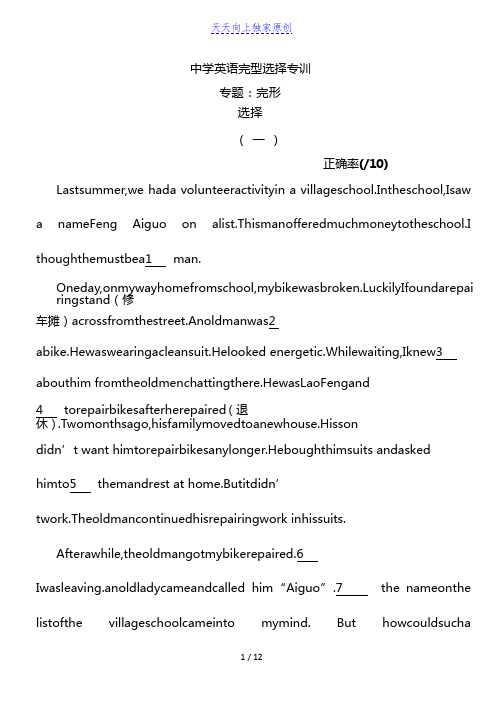
中学英语完型选择专训专题:完形选择(一)正确率(/10) Lastsummer,we hada volunteeractivityin a villageschool.Intheschool,Isaw a nameFeng Aiguo on alist.Thismanofferedmuchmoneytotheschool.I thoughthemustbea1 man.Oneday,onmywayhomefromschool,mybikewasbroken.LuckilyIfoundarepai ringstand(修车摊)acrossfromthestreet.Anoldmanwas2abike.Hewaswearingacleansuit.Helooked energetic.Whilewaiting,Iknew3 abouthim fromtheoldmenchattingthere.HewasLaoFengand4 torepairbikesafterherepaired(退休).Twomonthsago,hisfamilymovedtoanewhouse.Hissondidn’t want himtorepairbikesanylonger.Heboughthimsuits andasked himto5 themandrest at home.Butitdidn’twork.Theoldmancontinuedhisrepairingwork inhissuits.Afterawhile,theoldmangotmybikerepaired.6Iwasleaving.anoldladycameandcalled him“Aiguo”.7 the nameonthe listofthe villageschoolcameinto mymind. But howcouldsuchacommonrepairman8somuchmoney?Iaskedhimifheknewthatvillage.Hetoldmeitwashis hometownandthe9therestillneededhelp.Sohealwayssavedmoneybyrepairingbikestohelp them.ThenI wassurethathewasthepersonon the10 .( ) 1. A. rich B. poor C. healthy D. unhealthy( ) 2. A. selling B. washing C. riding D. repairing( ) 3. A. everything B. something C. anything D. nothing ( ) 4. A. started B. failed C. feared D. remembered( ) 5. A. wear B. lose C. make D. lend( ) 6. A. Unless B. When C. If D. Though( ) 7. A. Luckily B. Sadly C. Usually D. Immediately( ) 8. A. give awayB. throw away C. take back D. give back ( ) 9. A. workers B. visitors C. riders D. villagers( )10. A. way B. map C. list D. book1-5 ADBAA6-10 BDADCOnedayIranintoastrangerashepassedbyme.Isaidsorryto1 immediately.Hereplied withasmileandsaid,“I’msorry, 2 . I wasn’twatchingoutfor you.”Later that day,whenIwascooking,my3 wastooclosetomeWhenIturnedtoget4 milk. Inearlyknockedherover.“Moveoutof theway!”I shouted.Shewalkedaway5 ButI didn’tfeellikeI hadtosaysorry to her.WhileIwasinbedthatnight,myhusbandsaidtome.“Whiledealingwithastranger,youwere6 ,butwiththedaughteryoulove,youwereunkind.Yourdaughter7 yousomeflowersshe pickedherself.You’llfindtheminthekitchenby thedoor. Haveyou seenthetears8 hereyes?”Ifeltquitesorryformylovelydaughter.ThenIwenttoherbedroomtotellhertha tIshouldn’t have9 her.Shekissedmeon mycheekandsaid,“It’sOK, mom.I loveyou anyway.”If wecanbepolitetostrangers,10 can’twedo thesamefor theoneswelove?( ) 1. A. he B. she C. him D. her( ) 2. A. too B. either C. also D. neither( ) 3. A. son B. daughter C. mother D. father( ) 4. A. little B. few C. any D. some( ) 5. A. sadly B. happily C. hardly D. carelessly( ) 6. A. impolite B. polite C. angry D. nervous( ) 7. A. took B. bought C. borrowed D. brought( ) 8. A. in B. with C. forD. of( ) 9. A. looked at B. laughed at C. shouted at D. pointed at ( )10. A. how B. what C. which D. why1-5 CABDA6-10 BDACDWhenIwasinmiddleschool,IfeltIwasalwayslettingpeopledown.OnceIbroughtmy1Daisytomyhome.I noticedthatallmyfamilymembersseemedto 2 Daisybetterthanme.Ifeltvery3 .Ieventhoughttheydidn’tloveme.IwonderedwhethertheywouldmissmeifI diedsomeday.4 Itoldmymum,“DaisyismorepatientthanIhaveeverbeen.Youmustwanther tobeyour daughterinsteadof me.”MymumexplainedthatDaisywas a lovelygirl,but5 couldreplace(代替)mein thefamily. ShesaidIwastheonlypersonwhocouldfillmyrole.ShemademerealizethatevenifI made6,Iwasabelovedmemberof thefamilywho couldneverbereplaced.Fromthenon,Itriedto7 outwhoIwasandwhatmademespecial.Ilookat8inanew way.ThenIstartedtobepositive(积极的)towardsmylife,andIwashappyaboutwhoI9 was.I cametofeelmuchbetterasIknewthatno onecouldeverreplaceme.Eachofusholdsaspecialplaceintheworld.Youarespecial,nomatterwhatotherssayorwhatyoumaythink.So10 thatyou willbereplaced.You can’tbe.( ) 1. A. daughter B. son C. friend D. uncle( ) 2. A. like B. know C. understand D. learn( ) 3. A. lucky B. sad C. bored D. glad( ) 4. A. But B. So C. Though D. Whether( ) 5. A. anybody B. somebody C. everybody D. nobody ( ) 6. A. mistakes B. faces C. wishes D. decisions( ) 7. A. put B. find C. look D. clear( ) 8. A. itself B. herself C. himself D. myself( ) 9. A. nearly B. hardly C. really D. almost( )10. A. forget B. worry C. consider D. think1-5 CABBD6-10 ABDCAOnahotsummermorning,anoldfishermanwasfishingnearariver.A childwentbyseeinghimfishing.Afterafewminutes,thechildfoundthatthefishermanwasreallygood1 fishing.Because hedidn’t spendlong2 afull basketoffish.Asthe fishermanfelt thatthe childwasclever,heoffered himsomefish.Butthechild3 hishead.Thefishermanaskedin4 , “Whynotwantthefish?”Thechildpointedatthefishingrod(杆)inhishandsandsaid,“Ionlywantthat.”“Whydo you onlywanttherod?”askedthefisherman.“Eatingupallthefishyougavedoesn’ttakelong.ButifIhaveafishingrod,Icango5 by myselfandI won’tbeafraidof nothavinganymorefishtoeat.”Ithink youwill6 saythatthe childisverycute.Wrong!Ithink ifhedoesn’tknow7 tofish, hecan’thavefishtoeat,eventhoughhehasthefishingrod.Soit’s8 toonlyhaveafishingrod. Fishingskillsarethe9 important,notthefishingrod.Inmodernsociety,some peoplethinkthat iftheyhavea“fishing rod” intheir life,they’ll10 fearthewindandrain,justlikethechildwho thoughtthatifhehadafishingrod,hewouldhavefishtoeat.( ) 1. A. for B. in C. at D. with( ) 2. A. to catch B. in C. for catching D. catching ( ) 3. A. lifted B. nodded C. shook D. shaked ( ) 4. A. surprises B. surprise C. surprised D. surprising ( ) 5. A. fished B. fishing C. fishes D. fish( ) 6. A. mainly B. finally C. exactly D. certainly ( ) 7. A. how B. where C. what D. when( ) 8. A. harmless B. homeless C. useless D. careless ( ) 9. A. most B. least C. less D. more( )10. A. not long B. not longer C. no long D. no longer 1-5 CDCBB6-10 CACADOnedayamansawanoldladystandingbyhercaronthesideoftheroad.Hecoul dseethatshe needhelp.1 hestoppedhiscarinfrontof herandgotout.Eventhoughthemanhadasmileonhisface,theoldladywasworried.“ 2 hadstoppedtohelp forthelasthour.Washegoingto hurt3 ?He didn’tlook safe,helookedpoorand hungry.” theold ladythought.Hecouldseethatshewasworried.Sohesaid,“Iamhere4 you,madam.Itseemsthatyouhave aflattire(车胎漏气).5 don’tyou waitinthecarwhereit’swarmwhileI changethetirefor you?Bytheway,mynameisBryantAnderson.”Thoughfeelingdoubtful,theoldlady6 hercar.About20minuteslater,hewasdone,theoldladyaskedBryant7 sheshouldpay.Bryant8 thoughtaboutbeingpaid.Hetoldherthatifshe 9 wantedtopayhimback,thenexttimeshesaw someonewho neededhelp,shecouldgivethatpersonherhelp.Themanwaiteduntiltheladystartedhercaranddroveoff.Itwasacoldday,buthefelt10 ashewenton hiswayhome.( ) 1. A. And B. But C. Or D. So( ) 2. A. Everyone B. Someone C. Anyone D. No one( ) 3. A. him B. her C. me D. us( ) 4. A. to hurt B. to help C. to trouble D. to visit ( ) 5. A. Why B. What C. Which D. When( ) 6. A. got out B. got away C. got into D. got off ( ) 7. A. how much B. how far C. how long D. how soon ( ) 8. A. ever B. never C. seldom D. always( ) 9. A. clearly B. carefully C. really D. completely ( )10. A. good B. sad C. alone D. angry1-5 DDBBA6-10 CABCA天天向上独家原创9 / 12(六)正确率(/10)As achild,I gotangryquiteeasilyandwasnotgoodatcommunicatingwithothers.Istillrememberitwasanearlyautumn.Some1 startedtoturnyellowandtheweatherbecamecool.Oneday,asI wasgettingreadyfor school,mymothercarelesslyhandedmemyfather ’sves (t 背心) insteadof 2 .At thattime,I was gettingtohavea3 sizethanmyfather,so when I puton the vest , IfeltasifIwasn ’tabletobreathe!Irealizedthatitwasasmallmistakewhichwas4 bymymother, butsomehowthebreathlessfeelingwassostrongthatitmademeveryangry.Mymothersaidsorrywithasmile ,butIshoutedather5 thinkingmuch.Igot itoffmybodysowildly thatImadeaholeinit.Iputonmyown vestandrushedoutof thehouse6 mymothercouldstopme. Later,mymother sharedherbadfeelingswithmyfather,“Seewhatyoursonhasdone.” Insteadof sayinghewouldscold (责备)orbeatme,myfather7 ter whenmymothertoldmeaboutmyfather ’sresponse (反应),I feltterriblysorry formybadbehavior (行为). My father ’sgentlekindnesstaughtmealessonwhichI would8 forget.天天向上独家原创10 / 12 Onthatday,Idecidednottoletanger9meanylonger.Ofcourse,therearetimeswhenIamangry.However,wheneverthathappens,Iwilltrytoremembermyfather ’s10 .Italwaysreminds(提醒)metothinkaboutothers ’feelingswhenI getangry. ( ) 1. A. books B. walls C. photos D. leaves ( ) 2. A. hers B. his C . mine D. ours ( ) 3. A. thinner B. smaller C. larger D. shorter ( ) 4. A. given B. made C. shown D. chosen ( ) 5. A. without B. about C. with D. of ( ) 6. A. after B. before C. when D. since ( ) 7. A. sadly B. angrily C. bravely D. quietly ( ) 8. A. never B. often C. always D. sometimes ( ) 9. A. forget B. help C. leave D. control ( )10. A. vest B. school C. anger D. mistake1-5 DCCBA6-10 BDADA。
九年级英语中考英语复习完形填空必背指南固定搭配
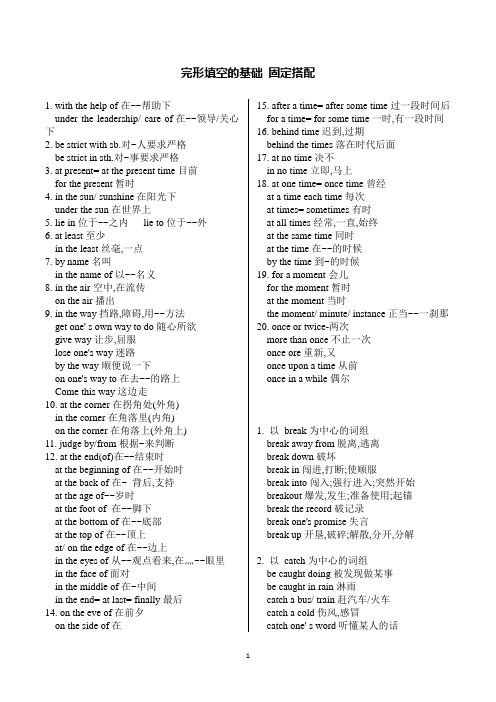
完形填空的基础固定搭配1. with the help of在~~帮助下under the leadership/ care of在~~领导/关心下2. be strict with sb.对~人要求严格be strict in sth.对~事要求严格3. at present= at the present time目前for the present暂时4. in the sun/ sunshine在阳光下under the sun在世界上5. lie in位于~~之内lie to位于~~外6. at least至少in the least丝毫,一点7. by name名叫in the name of以~~名义8. in the air空中,在流传on the air播出9. in the way挡路,障碍,用~~方法get one' s own way to do随心所欲give way让步,屈服lose one's way迷路by the way顺便说一下on one's way to在去~~的路上Come this way这边走10. at the corner在拐角处(外角)in the corner在角落里(内角)on the corner在角落上(外角上)11. judge by/from根据~来判断12. at the end(of)在~~结束时at the beginning of在~~开始时at the back of在~ 背后,支持at the age of~~岁时at the foot of 在~~脚下at the bottom of在~~底部at the top of在~~顶上at/ on the edge of在~~边上in the eyes of从~~观点看来,在灬~~眼里in the face of面对in the middle of在~中间in the end= at last= finally最后14. on the eve of在前夕on the side of在15. after a time= after some time过一段时间后for a time= for some time一时,有一段时间16. behind time迟到,过期behind the times落在时代后面17. at no time决不in no time立即,马上18. at one time= once time曾经at a time each time每次at times= sometimes有时at all times经常,一直,始终at the same time同时at the time在~~的时候by the time到~的时候19. for a moment会儿for the moment暂时at the moment当时the moment/ minute/ instance正当~~一刹那20. once or twice-两次more than once不止一次once ore重新,又once upon a time从前once in a while偶尔1. 以break为中心的词组break away from脱离,逃离break down破坏break in闯进,打断;使顺服break into闯入;强行进入;突然开始breakout爆发,发生;准备使用;起锚break the record破记录break one's promise失言break up开垦,破碎;解散,分开,分解2. 以catch为中心的词组be caught doing被发现做某事be caught in rain淋雨catch a bus/ train赶汽车/火车catch a cold伤风,感冒catch one' s word听懂某人的话catch sight of发现,瞥见catch up with赶上,追及,追上3. come为中心的词组come across偶尔发现,想起;越过;偿付come along一道来,陪伴;进步,进展;出现come at达到,求得,得到;扑向,袭击come back回来;恢复,复原come down倒下;降落;跌落;病倒come from来自,起源于,从~~产生,生于come in进来,进入;流行起来;获名次come into being发生,产生,出现,形成come into power开始执政,当权,当选come on上演;开始;赶快;发展;登台;(问题)被提出come to know开始了解到come out出来,传出;出版;结果是;褪色;(秘密)泄露come to苏醒,复原;共计;达到;归结于come to an end终止,结束come true实现,成为现实;证实come up走近;上楼;长出,发芽4.以do为中心的词组be done in精疲力竭be done with完全结束do a good deed做一件好事do away with去掉,废除;弄死;浪费do good to=do sb.good)有益于do harm to(=do sb.good)有害于do its work有效,有作用do much极有用do wrong to做错do one' s best尽某人最大努力do one' s homework做作业do one' s utmost尽力而为do proud足以使~~骄傲do sb. justice公平对待某人do some cleaning+ing etc.)搞卫生do sb. a favor帮助某人do without.不需要,不用do wonders创造奇迹have nothing to do with与~~无关have something to do with和~有关That will do.行了够了5.以get为中心的词组get about徘徊,走动,旅行;流传get accustomed to习惯于,对习以为常get across度过,通过,横过;说服,使理解get ahead of胜过,超过get along前进,进步;同意;离去get along with与~~相处get at发现,了解;掌握;攻击have got to do不得不,必须get away离开,逃脱get back取回,回来;报复get behind落后;识破get down咽下;写下;使沮丧,使抑郁get down to认真对待,静下心来get familiar with熟悉get hold of获得,取得get home到家get in进入,陷入;牵涉get off下车;动身get on上车;穿上;进步,使前进;成功相处get upon with进步;在~~方面获得成功get one's hand in熟悉;习惯get out of由~~出来,从~~得出;避免;退休get over越过;恢复,痊愈;克服;完成get ready for为~~作准备get rid of除去,去掉;免除,摆脱get through到达,完成,通过;及格get together积聚,积累;商谈,取得一致意见get up起床,起立;研究,钻研;致力于;安排,组织get used to习惯于6.make为中心的词组be made from由~~原料制成be made of由~~材料制成be made up of由~~组成make a fool of 愚弄,欺骗make a mistake弄错make a point of doing强调;认为~~重要;决心,坚持make advantages/ use of使用,利用make after追求,追赶make certain确信,把~~弄清楚make contact with接通,与~~接触,与~~联系make for去向,向~前进;有利于make friends with和~~交友make into把~~制成,使~~转变为make much or重视;理解;赏make one's own当作自己的看待make oneself at home随便,别拘束make out填写;开支票;理解;辨认make the best of尽量利用;极为重视make up弥补,修理;赔偿,补偿;起草;编造;化装make up to接近,巴结;向~~求爱make way for为~~让路,让路于on the make急求成功;增加9.以put为中心的词组put aside把~~放在一边;搁置;排除put away把放好,把~~收拾;储藏;吃喝,吃掉put back把放回原处;驳回put down放下;镇压;制止;记下;削减:降落put forward提出;拨快;建议,推荐;提倡,倡议put~into把~~放入;插入;翻译成put off推迟,延期;消除;推脱,推辞put on上演;穿上,带上put up with忍受,容忍put one's heart into全神贯注,专心致志put up举起,挂起提名,推荐;陈列6.以give为中心的词组be given to沉溺于,癖好give about分配;传播give and take相互迁就give away赠送;牺牲;泄露;颁发give back归还give cause给予~~的理由give ear to侧耳倾听give forth发出,放出;发表give in屈服,让步,投降give in to同意,接受;向~让步give off发出(烟,气味)give oneself out to be/as自称为give oneself up to专心于;向~~自首give out分发,公布give place to让位于,被~~所替代give rise to引起,导致;使~~发生give up放弃;停止give way to让步,退;屈服于7.以look为中心的词组look about四下环顾;查看look after照顾,看管look around东张西望look at注视,着眼于look back回顾look for寻找;期待,期望look down on俯视;轻视look forward to盼望,期待look into窥视;调查;浏览look like看起来象look on旁观;面向look out向外看;注意;当心,堤防look over从上面看过去;检查look through透过~~看去;看穿,浏览look up to仰望,10.以take为中心的词组be taken aback吃惊take a seat就坐take a shower淋浴,洗澡take aim瞄准,设立目标take away拿走,减去;夺去take by surprise出奇制胜take one' s place就坐,入坐take care of心,注意;照顾;提防;谨慎;处理,对付;负责take office就职take off脱去,除去;离开;起飞take one' s temperature量体温take part in参与,参加take it easy别着急,慢慢来take place= happen发生,举行take the place of代替take pride in以~~为荣,对~~骄傲take sb. by the arm拉某人的胳膊11.以turn为中心的词组give a new turn to对...以新的看法take turns轮流做某事out of turn不按次序的,不合适宜的take one' s turn to do轮到做turn a blind eye to对~~视而不见turn against背叛,采取敌对态度turn back折回,往回走turn down折叠,翻下,驳回,拒绝考虑turn into走进;变成,变为turn to ~for help求助于turn off关上(自来水,电器开关);解雇,辞退;避开(问题);制造;生产turn on打开(自来水,电器开关);turn one' s attention to把注意力转向turn out培养;证明是;制成;实际情况是turn out to be原来是,证明是,结果是turn over a new leaf翻开新的一页,重新开始turn upside down颠倒过来,翻过来;使陷入混乱。
- 1、下载文档前请自行甄别文档内容的完整性,平台不提供额外的编辑、内容补充、找答案等附加服务。
- 2、"仅部分预览"的文档,不可在线预览部分如存在完整性等问题,可反馈申请退款(可完整预览的文档不适用该条件!)。
- 3、如文档侵犯您的权益,请联系客服反馈,我们会尽快为您处理(人工客服工作时间:9:00-18:30)。
完形填空题判断的依据
4.▉顺序线索(答案B) • After he wrote the letter, she___it and then ___it. • A. posted; signed B. signed;posted 5.▉反义词线索(答案A) • He used to be lazy. But now he is quite ___. • A. hardworking B. handsome
Teaching aims: • 中考复习专题指导:
1.“完形填空”题方法解析。
I.
完形填空例题(1)
ห้องสมุดไป่ตู้
Someone says : “Time is money .” But I think time is __1___ important than money . Why ? Because when money is spent , we can get it back . However , when time is __2___ , it’ll never __3___ . That is __4___ we mustn’t waste (浪费)time . It goes without saying that the __5___ is usually limited(有限的) . Even a second is very important. We should make full use of our time to do __6___ useful . But it is a pity that there are a lot of people who do not know the importance of time . They spent their limited time smoking , drinking and ___7__ . They do not know that wasting time means wasting part of their own __8___ . In a word , we should save time . We shouldn’t __9___ today’s work for tomorrow . Remember we have no time to __10___
We can see walls everywhere in the world. But the Great Wall of China is __1___ of all . The Chinese ___2__ it “The Ten-thousand-Li Great Wall .” It is in fact more than 6,000 kilometres long . It was really very difficult to build such a great wall __3___ any modern machines many centuries ago . They __4___ do all the work by hand . It __5___ millions of men hundreds of years to build it . The Great Wall ___6__ a history of over two thousand years . The men began to build the first part of it about 2,700 years ___7__ . Then Qin Shi Huang made the men join all the walls together . He thought that could __8___ the invaders from coming into the country . Today the Great Wall __9___ a place of interest . __10___ the Chinese people and the people all over the world come to visit it .
1.通览全文,了解大意。答题时,应先细读首句, 越过空挡通读全文,整体理解大意,找出信息词。 2.综合考虑,先易后难。通读全文后,可以根据全 文大意,展开逻辑思维,分析这一空格处在句中 的地位、前后的关系和它所起的作用,确定最佳 答案;第一遍做出三分之一,先确定有把握的答 案。第二遍逐个解决时,注意后线索的现象。 3.复读检验,消除疏漏。答案不仅要在原句中合理, 在全文中也要合理。看看这时的短文行文是否流 畅、意义是否连贯、逻辑关系是否合理。
• 例如:
• 富含哲理例如:四川成都完形填空 考题中:通过拟人化的手法——钥 匙了解锁的心,所以能顺利打开锁。 用来比喻人与人之间的交往要彼此 了解,具有哲理性。
• 这篇短文比喻恰当,通俗易懂,适 合学生的水平和生活实际。
IV.
完形填空解题指导
• 1.通览全文,了解大意。答题时,应先细读首句, 越过空挡通读全文,整体理解大意,找出信息词。 • 2.综合考虑,先易后难。通读全文后,可以根据全 文大意,展开逻辑思维,分析这一空格处在句中的 位置、前后的关系和它所起的作用,确定最佳答案; 第一遍做出三分之一,先确定有把握的答案。第二 遍逐个解决时,注意后线索的现象。 • 3.复读检验,消除疏漏。答案不仅要在原句中合理, 在全文中也要合理。看看这时的短文行文是否流畅、 意义是否连贯、逻辑关系是否合理。
完形填空例题(2)
1. A. the longest B. the nicest C. the highest D. the best 2. A. say B. ask C. shout D. call 3. A. no B. not C. without D. nor 4.A.must to B. had to C. have to D. wanted to 5. A. spent B. cost C. took D. used 6. A. had B. have C. has D. having 7. A. ago B. before C. after D. later 8. A. fight B. against C. stop D. beat 9. A. becomes B. has become C. became D. is becoming 10. A. Both B. Only C. All D. Every
I.
完形填空解题指导
完形填空题判断的依据
1.▉因果线索(答案B) • He was badly ill, so he was ___ • A. present B. absent 2.▉转折线索(答案A) • He was badly ill, however, he was ____. • A. present B. absent 3.▉让步线索(答案A) • He didn’t ___the test, though he worked hard. • A. pass B. fail
II.
“完形填空”命题与备考
1.完形填空题立足语篇,要求学生从全文
的整体角度去分析、归纳、猜测,考查 学生的思维能力。 2.注重短语、句型、习惯用语、动词时态、 语态的构成、名词、代词、形容词、副 词、介词等语义辨析和语义理解能力的 考查。
III.
完形填空试题的选文特点
1.多数试题在选材时考虑材料的教育性、趣 味性或实用性。 2.完形填空命题的短文绝大多数是以叙事性 为主的记叙文。例如:幽默故事、名人轶 事、社会热点问题、科普知识等。 3.许多文章或体现了人世间的亲情、友情, 或渗透着爱心、友善、真诚与关怀, 或饱含人生哲理,催人奋进、给人自信, 读后令人感动,使人深受启发。
1. A.much B.less C.much less D.even more 2. A.cost B.bought C.gone D.bring 3. A.return B.carry C.take D.bring 4. A.what B.that C.because D.why 5. A.money B.time C.day D.food 6. A.nothing B.something C.anything D.everything 7. A.reading B.writing C.playing D.working 8. A.time B.food C.money D.life 9. A.stop B.leave C.let D.give 10. A.lose B.save C.spend D.take
